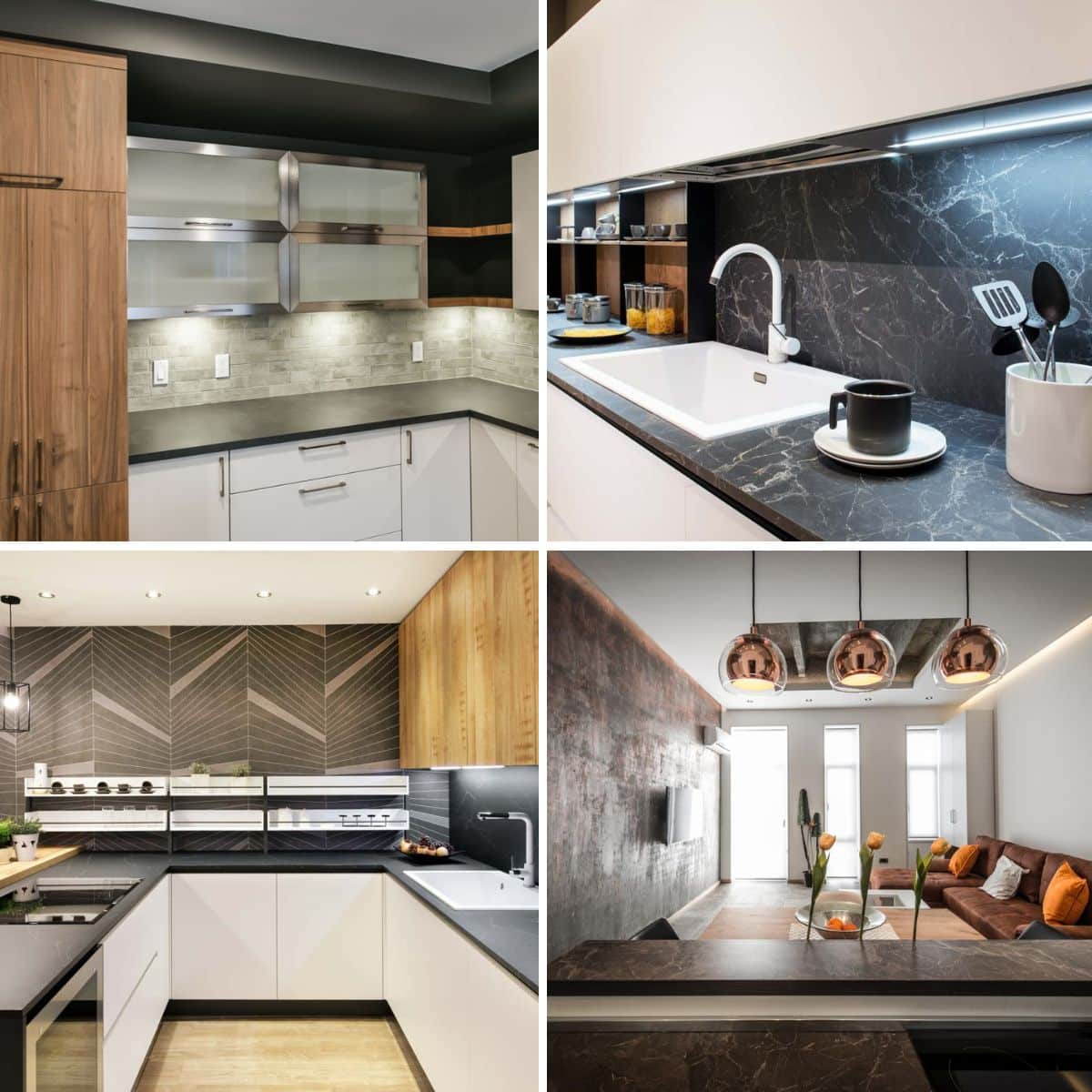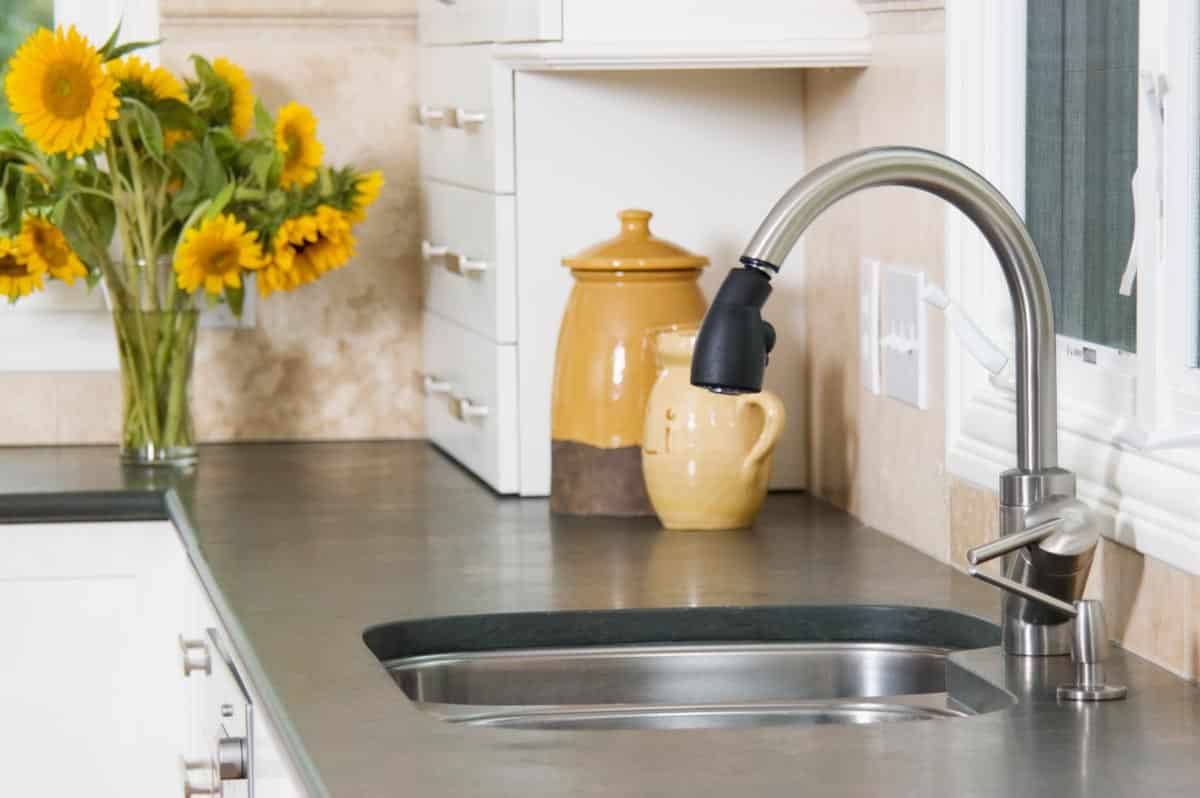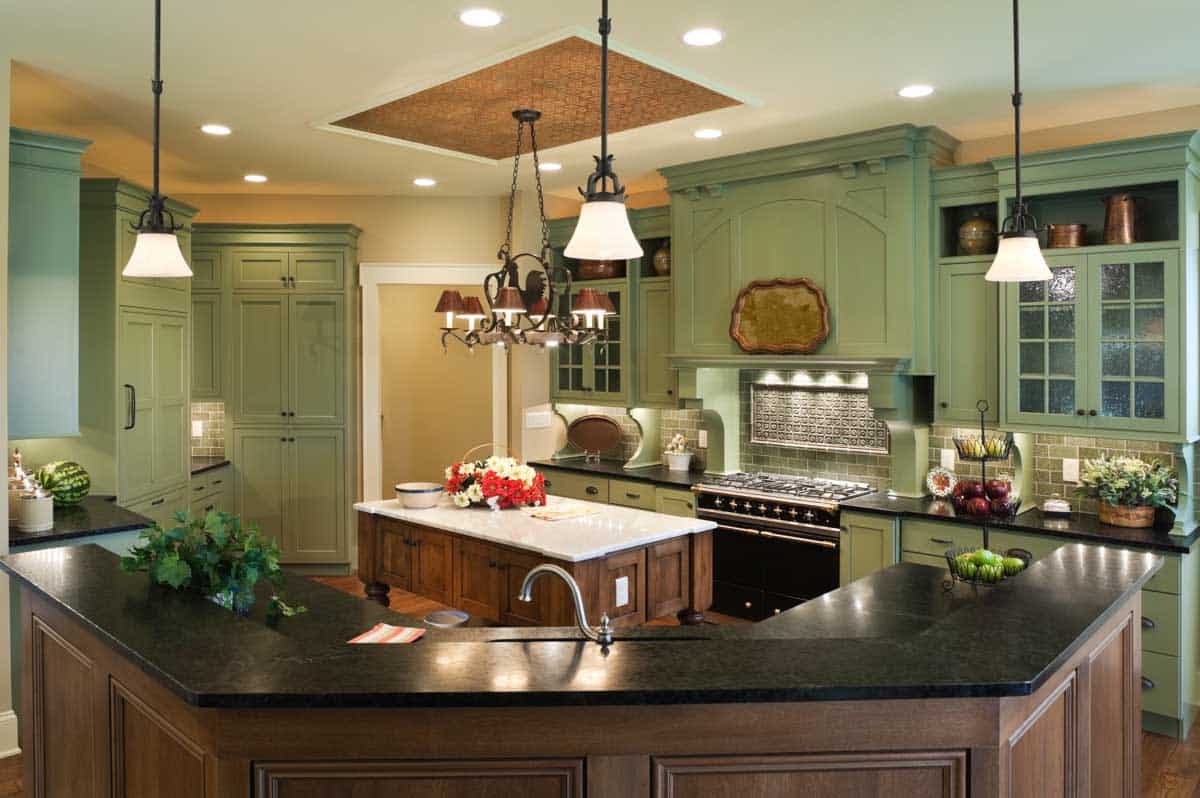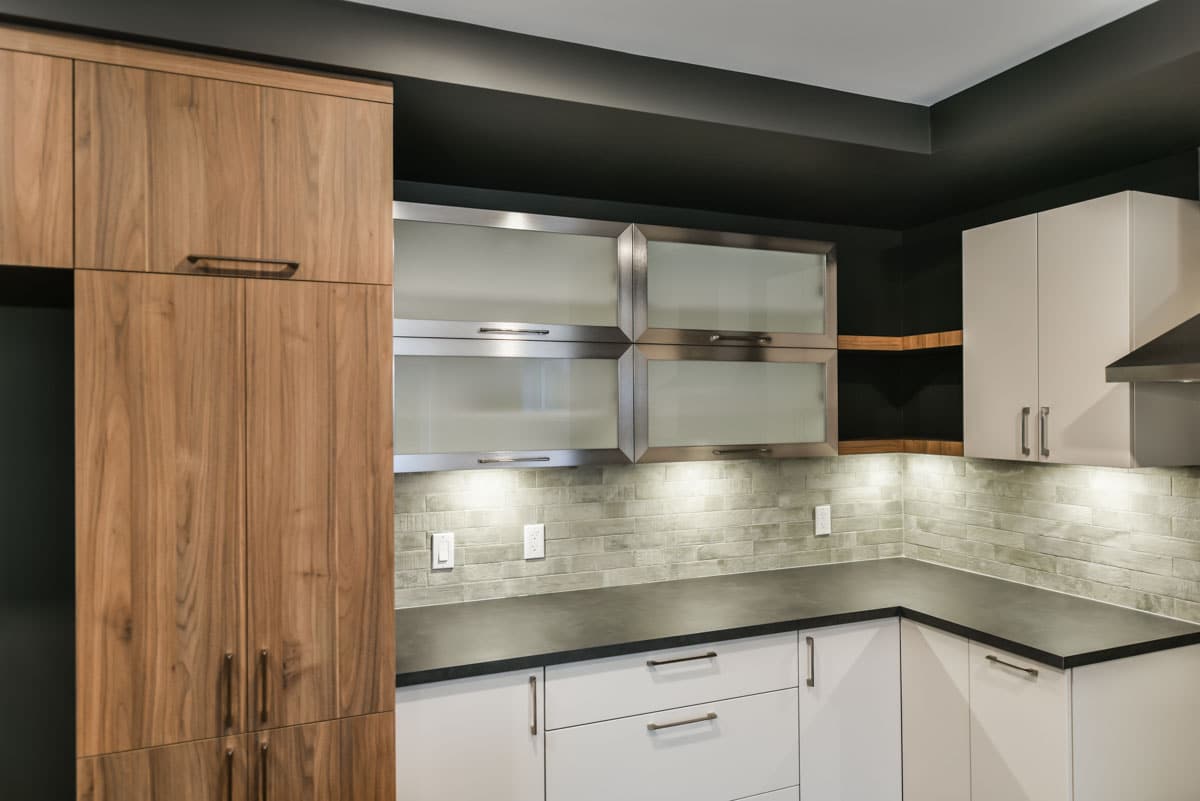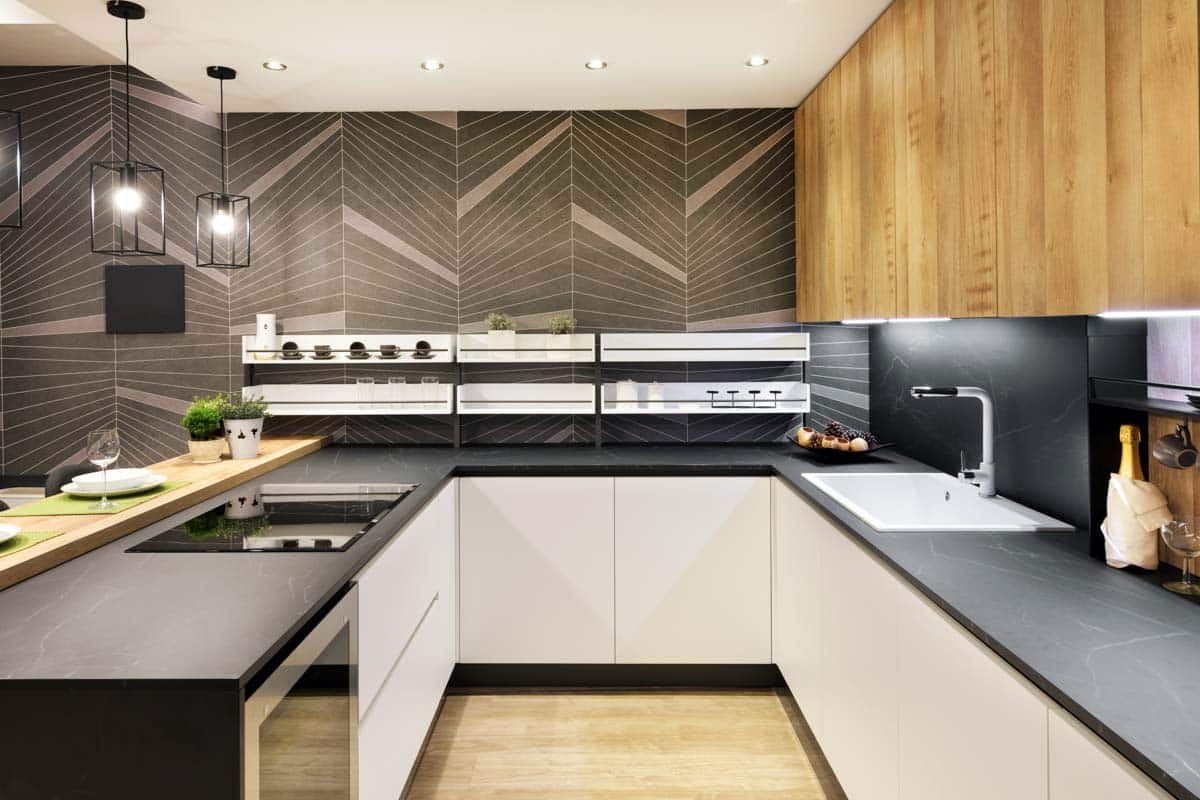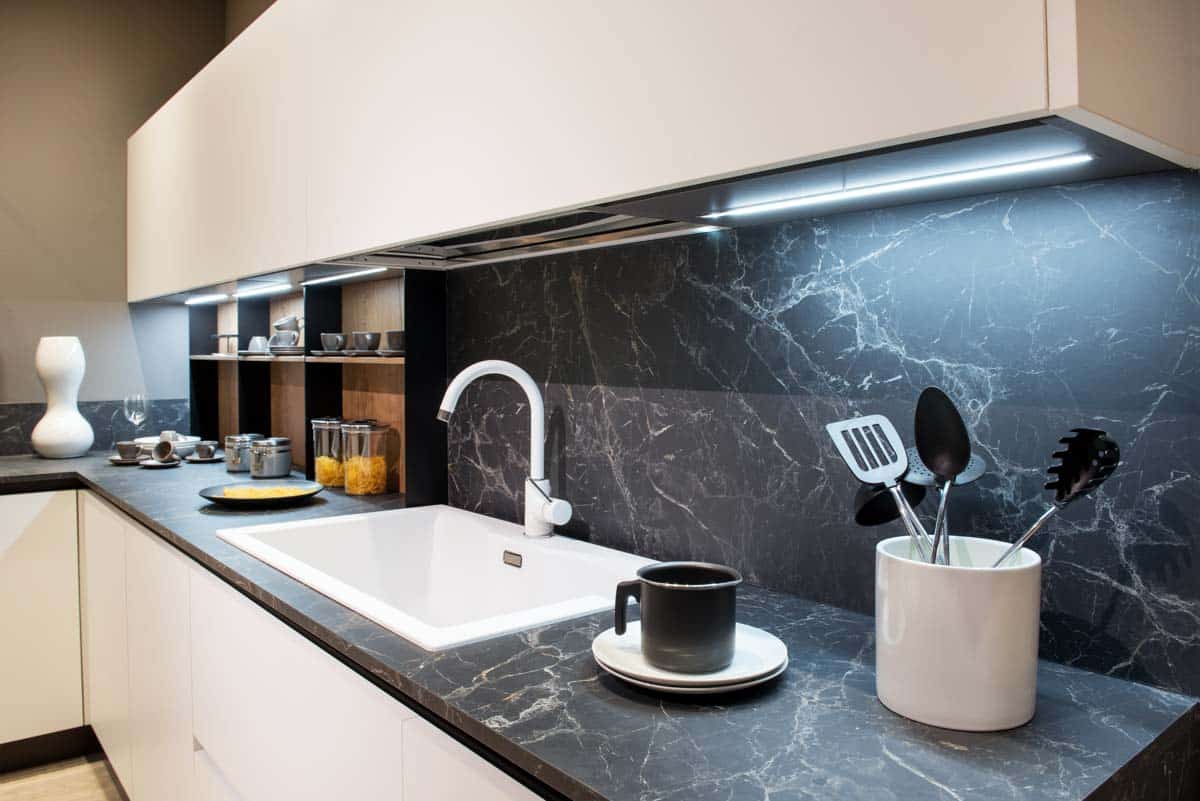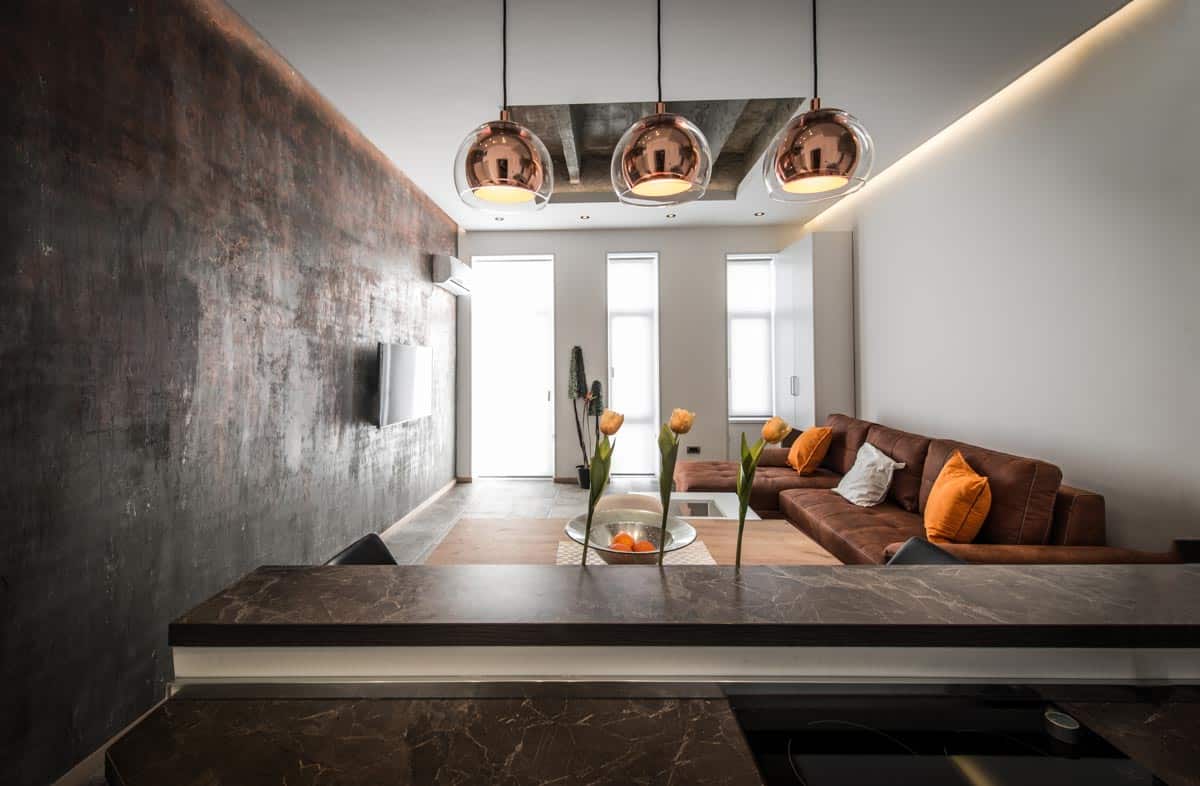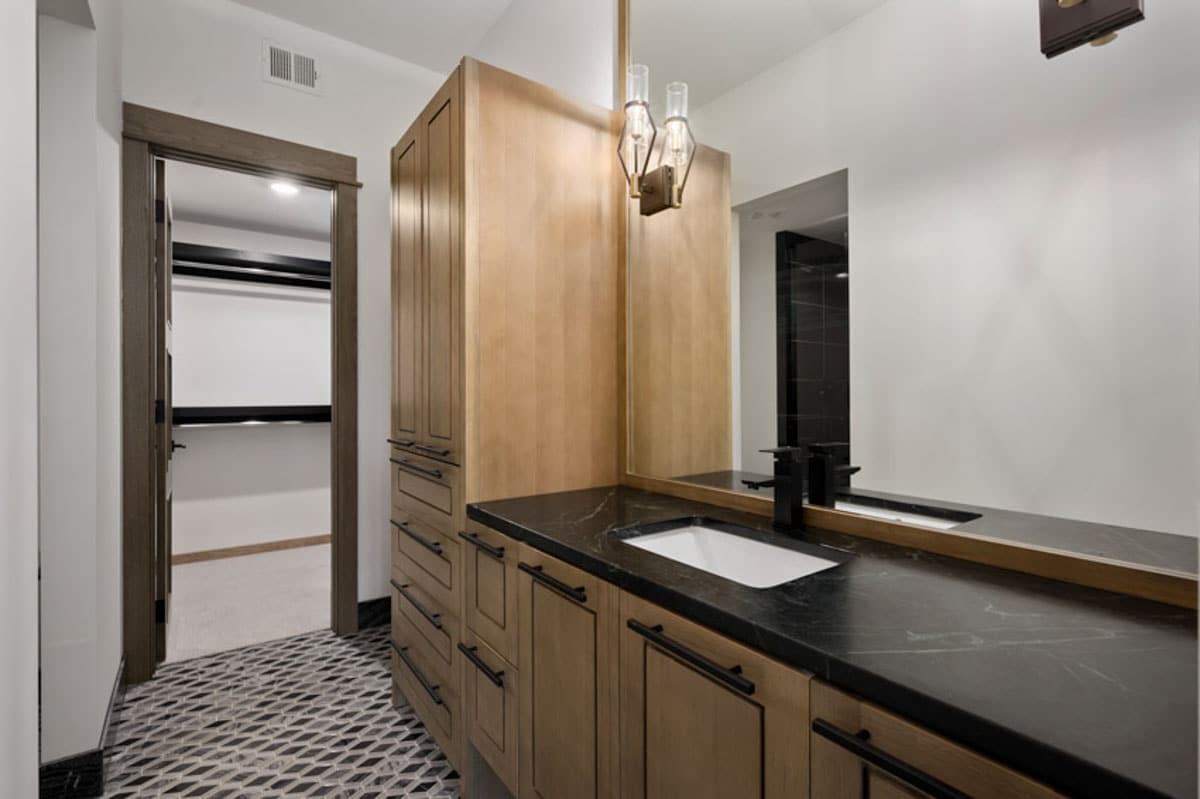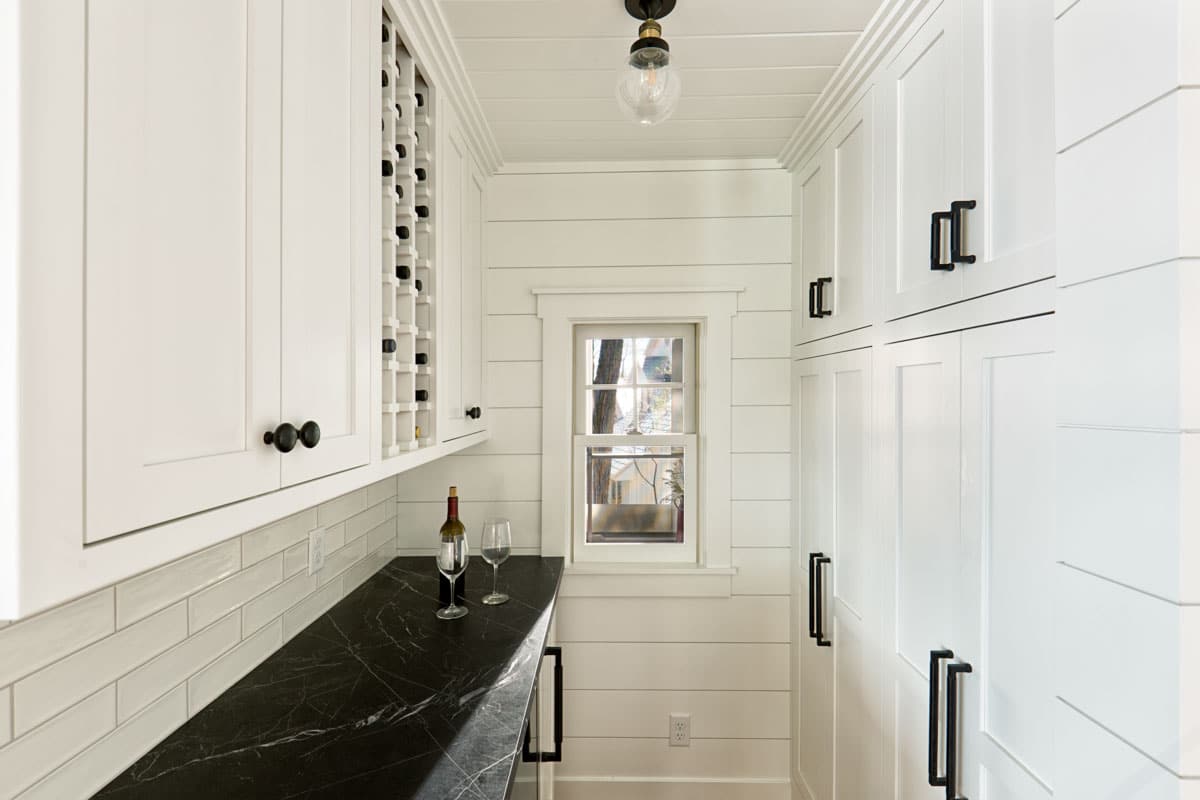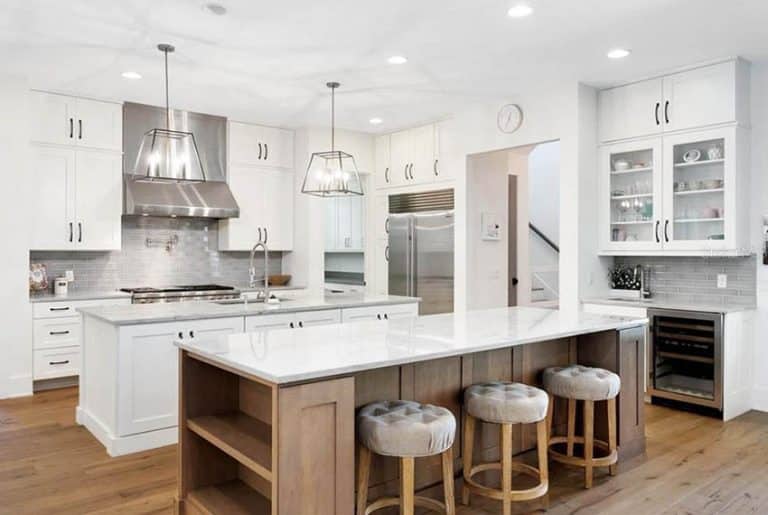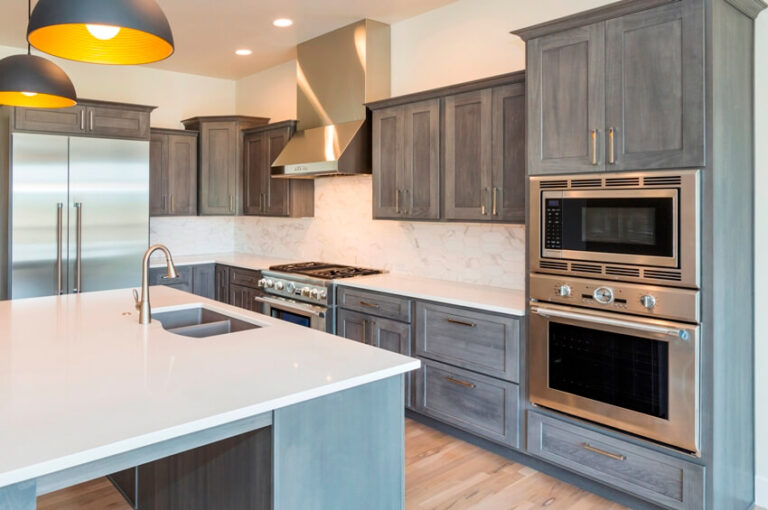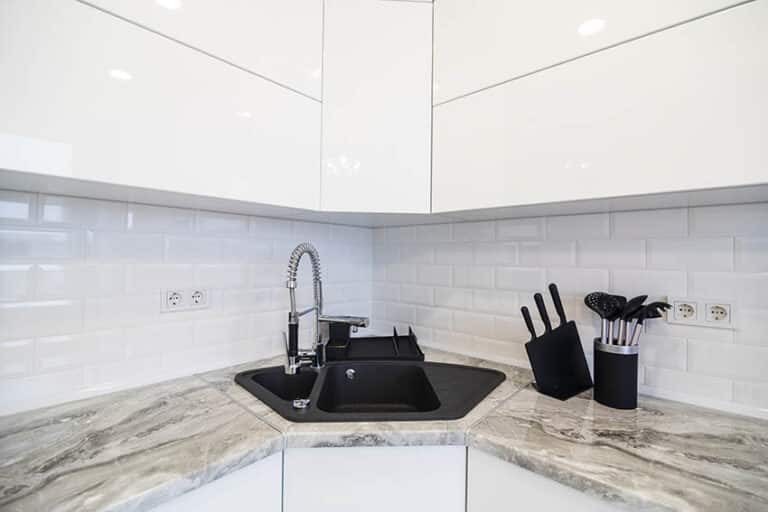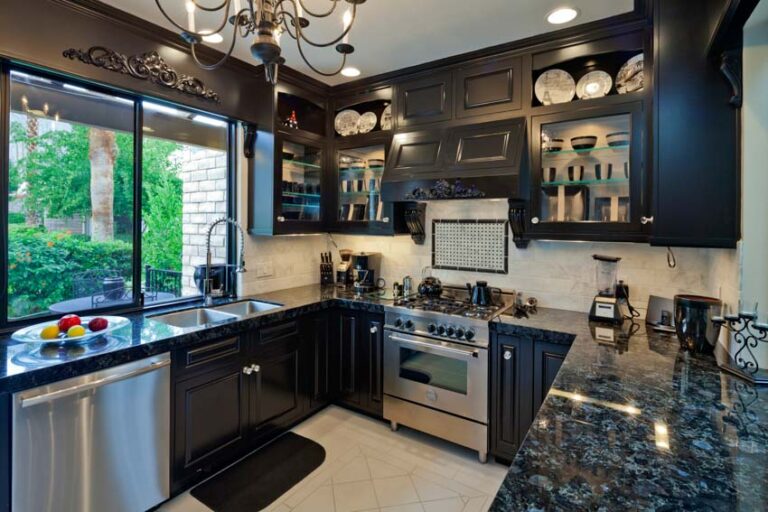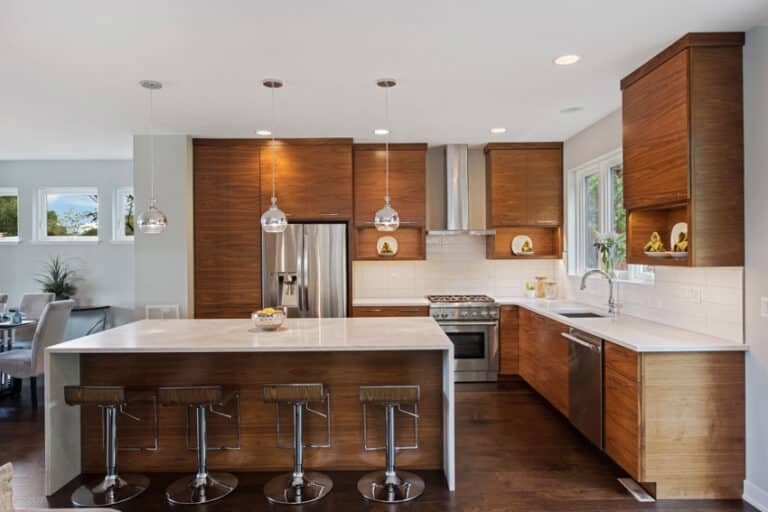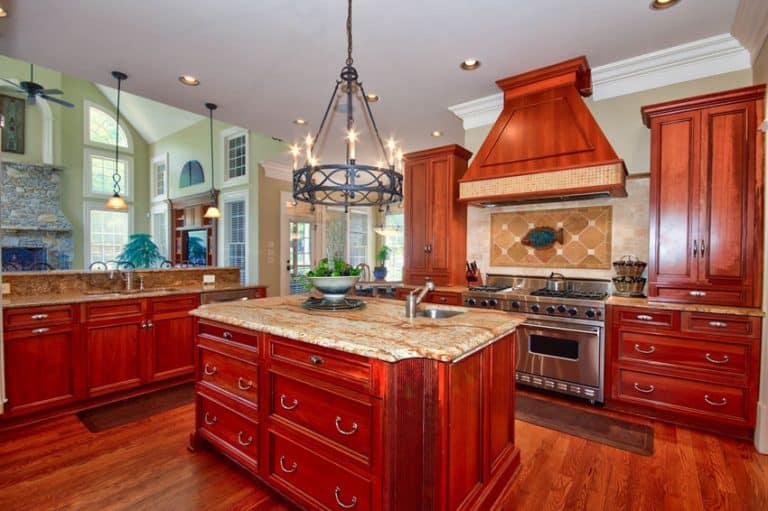Soapstone Countertops Pros and Cons
Below you’ll see the different soapstone countertops pros and cons, the advantages and disadvantages, maintenance needed, if they stain easily, and surface sealing tips.
If you happen to be in the market for a countertop material or are currently looking into options for updating your old kitchen, you might want to consider installing soapstone.
Soapstone has steadily been getting increasingly popular amongst homeowners, not just for its aesthetic appeal but also for its practical offerings. It’s considerably cheaper than its other hardstone counterparts and offers a sleek and minimalist look.
Soapstone is a unique stone countertop material primarily made of assorted minerals, quartz, and talc. It has a waxy texture which makes it quite lovely to the touch. It also has a veiny appearance with colors ranging from silver to black to grey or sometimes a combination of everything.
It slightly resembles the attractive veins you often see in marble slabs, so it’s as if you’re getting the look and feel of marble without the high price that comes with it.
It’s popular as a countertop material and has unique offerings to bring to the table. Its main one is that it is highly heat resistant, making it an ideal countertop material because you can place hot pans and other hot items directly on its surface without fear of damaging it.
It’s beauty is perfect in the kitchen or bathroom. Let’s go over some pros and cons of getting a soapstone countertop before you decide that it’s ultimately something you want for your kitchen.
Advantages of Soapstone
Natural stone material: Since soapstone is a naturally occurring material, it is highly sought after for its durability and looks beautiful when installed in kitchens and bathrooms.
Extremely resistant to heat: One of the main advantages of Soapstone over other stone slab materials is that it is extremely heat resistant. Using it as a countertop in the kitchen means that you can directly place hot pots and pans off the stove or oven and straight onto its surface without ever damaging it.
Looks elegant: Another great reason why Soapstone is among the well-loved types of kitchen countertop is because of how elegant and timeless it is. It has a naturally matte finish even though it isn’t porous. It’s a great addition to your kitchen in terms of aesthetics.
Soapstone has been used for kitchen countertops and sinks for hundreds of years. Though the stone itself is easily workable with non-specialized tools, its surface is non-absorbent and unaffected by either acids or alkalis. – Black & Decker The Complete Guide to Dream Kitchens, Sarah Lynch
Nonporous: Because it isn’t porous and doesn’t absorb liquids, stains, and other kitchen splatters compared to other countertop materials, it reduces staining and permanent discoloration because foreign stains, acids, and liquids don’t easily seep into the stone slab.
The density of the stone also prevents bacteria and germs from remaining in the cavities and can easily be wiped away from the surface.
If you want to improve and protect this even more, regularly applying mineral oil or some sealer time will help.
Soft to the touch: The stone has a unique texture and feel caused by its talc content, which many find enjoyable to touch.
Resistant to acids and chemicals: The non-porous consistency of the stone makes it easier to prevent harsh chemicals from penetrating the surface and causing damage.
Substances made of both acidic and alkaline materials, which are in many cleaning products, do not harm the surface like they would other materials, according to laboratory tests per the Natural Stone Institute.
Disadvantages of Soapstone
Low material density: One major downside to Soapstone is that it can be relatively soft compared to other materials, such as granite countertops. Because of its apparent lower material density, it can easily dent or chip off if heavier materials are placed on top of it, so it doesn’t hold up well against heavy loads.
It would help if you were extra careful with its installation, as it can be quite fragile and must be handled carefully.
Limited colors: Your color options with a soapstone countertop may also be limited. Soapstone doesn’t come in colors other than shades of grey to black. Colors can range anywhere from dark grey to light grey, but at the end of the day, it will always be within that spectrum at some point.
Suppose you’re looking for something more colorful and visually interesting on a kitchen countertop or with more pop of color. In that case, Soapstone may not be the material for you and the kitchen you are trying to plan out.
Scratches can be an issue: Although soapstone is a durable and long-lasting material, it also technically doesn’t mean it’s scratch-proof. Soapstone is notorious for developing a lot of minor nicks, dents, and scratches over time due to its softness.
It isn’t too much of an issue for some people, as these little flaws can add character and tell a story. However, if you want to maintain a pristine surface, this might not be the countertop material most suitable for you at the end of the day. You may even consider different types of kitchen countertop protection to prevent the material from being scratched.
Higher cost: The increased cost of the stone can be a disadvantage compared to other modern materials. However, it is in line with the price of similar natural products such as granite, marble and quartzite.
Are Soapstone Surfaces Hard To Maintain?
Compared to other hardstones such as granite and marble, soapstone countertops are easy to maintain. They aren’t as prone to staining as those other materials because they maintain a reasonably low porosity rate. It makes it easy to clean up spills and lowers the possibility of surface stains over time.
You also don’t need to maintain soapstone as regularly compared to other materials such as granite and marble. Because they’re a less porous material, they don’t require the same upkeep when it comes to sealing just for you to maintain the integrity of their original composition.
Getting soapstone countertops cleaned is also essential. You don’t need more than mild soap, water, or a soft rag to do it. Just go over the surface and give it a quick and gentle wipe-down, and you should be good to go.
It’s important to note that you should avoid using scrubs or abrasive materials when cleaning the soapstone‘s surface. This is because it has a matte and almost talc-like finish, and going over it with something rough might damage the surface’s finish for good and beyond repair.
Do Soapstone Counters Stain Easily?
The straightforward answer to this question is a definite no. Soapstone is one of the least stainable countertop materials in the market, which is why it has become popular among homeowners. It is mainly because of how unique this particular stone’s composition is.
Aside from its naturally low level of porosity, which makes it highly resistant to stains, soapstone also has high soapstone on talc content. This mineral is responsible for soapstone‘s soft and smooth texture and natural staining resistance.
When stone materials have talc content, it lowers their reactivity to acidic liquid materials such as vinegar, lemon juice, and other substances with citric acids that are commonplace in a kitchen environment. Spillage of similar materials won’t be that much of an issue because of soapstone‘s high talc content.
If spills do happen, cleanup can be pretty straightforward. Although soapstone is a material that can be resistant to staining, it doesn’t mean you should let stains seep in when they happen. It is, after all, still a stone material.
Although it isn’t as porous as the others, you should still do good practice cleaning up any stains or spillages right away. You can dramatically lessen the possibility of stains by promptly cleaning up any messes on the surfaces as soon as they happen.
As an additional note, although this isn’t required, you can add a layer of protection to your soapstone surface by applying a layer of mineral oil to it. This oil creates a barrier of protection, preventing soapstone surfaces from absorbing any foreign liquids while at the same time darkening its color and creating a patina that adds character to its overall appearance.
Does Soapstone Need To Be Sealed?
Soapstone doesn’t require sealing in the most basic sense of the word. However, it bears witness to use and abuse over time if not cared for correctly. For example, it has shown signs of darkening in the most frequently used areas.
It leaves the surface with uneven coloring and can be a bit of a dampener for those who would like to keep their kitchens looking pristine all the time. It can, however, appeal to homeowners who like this type of aesthetic and want to maintain the naturally occurring patterns and veining on the surfaces.
So the short answer is that soapstone doesn’t need to be sealed. On the other hand, if you’re in it for the long haul and would like to protect your investment and keep it looking new and well-maintained through the years, you might as well go out of your way to get it sealed. You won’t ruin your soapstone countertop by not sealing it, but you also aren’t doing much to preserve it and protect your investment while at it.
Again, we’d like to highlight that although soapstone doesn’t easily stain end of the day, it’s not entirely impervious to it. It won’t damage it per se, but it might ruin its appearance without an additional layer of protection coming from being sealed periodically.
Can You Put Hot Pans on Soapstone?
This is one of the great joys homeowners can get from investing in a soapstone countertop. Putting hot pots and pans directly on a soapstone surface won’t cause any damage. It is the main reason why soapstone is so popular with homeowners in general.
It is one of the best materials out there to handle direct heat coming from kitchen cookware that is fresh off of the stove, ovens, or the grill.
Soapstone is considered a heat sink. It means that its heat retention capabilities are exceptional. It holds and absorbs an extensive amount of heat without radiating it out to its surroundings that easily, limiting the possibility of damage or of you getting burned during the process.
This material is also considered noncombustible, meaning it will not burn or catch fire despite being exposed to high and extreme heat. It is a very underrated safety feature that doesn’t get enough praise but is something you ought to know as someone who may be in the market for a soapstone countertop.
Most salespeople will rave about Soapstone‘s ability to deflect stains, but they never discuss this safety feature. Most fire incidents at home start in the kitchen, so that’s one thing you need to consider when you’re in the market for a countertop material. Soapstone will do the job nicely. It puts you in a pretty good spot, knowing your countertop material isn’t combustible.
And lastly, soapstone isn’t a material that reacts nor expands with temperature changes. It means that the stone is less likely to break if it gets hot or cool quickly due to placing a hot pan directly on the surface.
Does Soapstone Show Water Spots?
As previously mentioned, soapstone can hold itself well against stains, and water spots are just one example of stains one can face in the kitchen. Although not immune to them, soapstone can show fewer water spots because of its color and other characteristics.
For starters, it has a naturally matte finish. Glossy surfaces are very prone to water spots, whereas matte ones tend to hide them well. Because glossy or polished surfaces have reflective properties, watermarks are almost always and immediately visible. Matte surfaces, on the other hand, disperse light. It makes watermarks and other stains less noticeable to the naked eye or without closer inspection.
Also, because soapstone holds and retains heat for extended periods, any water spillages or droplets tend to evaporate from its surfaces quickly. That and its nonporous surface would mean that water won’t linger on it, helping it to evaporate quickly and minimizing the possibility of water spots during the process. This advantage makes soapstone bathroom countertops a good choice for homeowners.
Take note, though, that hard water can be an issue. Although it can evaporate quickly from your soapstone countertop’s surfaces, it can leave behind a trail of mineral deposits, leaving streaks on the material.
Hence, it’s essential to maintain it by promptly wiping up spills and occasionally giving it a rub of mineral oil or a layer of proper sealing. It can do wonders in aesthetics and longevity and is something your future self will thank you for further down the road.
Can You Use Clorox Wipes On Soapstone?
As a general rule of thumb, avoiding harsh chemicals and substances that might damage any natural stone countertop material would be best. That same rule applies to the maintenance of your soapstone countertop.
It’s as durable and heat resistant as ever, but using harsh substances such as Clorox wipes may end up stripping off its natural surface protectants, and you wouldn’t want to do that. For starters, soapstone is chemically superior because of its natural talc content.
With prolonged use, Clorox wipes may alter the soapstone countertop’s appearance and dull its natural finish.
Cleaning pads like this are naturally abrasive and can strip off soapstone‘s natural finish. It means that your soapstone countertop may not be able to maintain its naturally soft and smooth texture.
There’s also the possibility of etching. Soapstone doesn’t react well to acids, as this can dull the texture of its surfaces and cause etching. Although it won’t take away from the structural integrity of the countertop, it can lessen its aesthetic appeal.
See more related content in our article about terrazzo kitchen countertops on this page.

